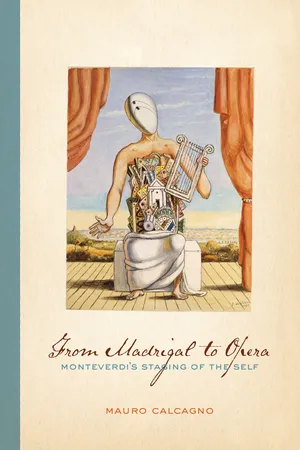From Madrigal to Opera
About this book
This pathbreaking study links two traditionally separate genres as their stars crossed to explore the emergence of multiple selves in early modern Italian culture and society. Mauro Calcagno focuses on the works of Claudio Monteverdi, a master of both genres, to investigate how they reflect changing ideas about performance and role-playing by singers. Calcagno traces the roots of dialogic subjectivity to Petrarch's love poetry arguing that Petrarchism exerted a powerful influence not only on late Renaissance literature and art, but also on music. Covering more than a century of music and cultural history, the book demonstrates that the birth of opera relied on an important feature of the madrigalian tradition: the role of the composer as a narrative agent enabling performers to become characters and hold a specific point of view.
Tools to learn more effectively

Saving Books

Keyword Search

Annotating Text

Listen to it instead
Information
Table of contents
- Cover
- Contents
- List of Illustrations
- Acknowledgments
- Introduction
- PART ONE. LA MUSICA AND ORFEO
- PART TWO. CONSTRUCTING THE NARRATOR
- PART THREE. STAGING THE SELF
- Epilogue: Subjectivity, Theatricality, Multimediality
- Appendix 1: Tables of Contents of the Madrigal Books
- Appendix 2: Monteverdi, Combattimento di Tancredi e Clorinda: Text and Translation
- Notes
- Index
Frequently asked questions
- Essential is ideal for learners and professionals who enjoy exploring a wide range of subjects. Access the Essential Library with 800,000+ trusted titles and best-sellers across business, personal growth, and the humanities. Includes unlimited reading time and Standard Read Aloud voice.
- Complete: Perfect for advanced learners and researchers needing full, unrestricted access. Unlock 1.4M+ books across hundreds of subjects, including academic and specialized titles. The Complete Plan also includes advanced features like Premium Read Aloud and Research Assistant.
Please note we cannot support devices running on iOS 13 and Android 7 or earlier. Learn more about using the app
